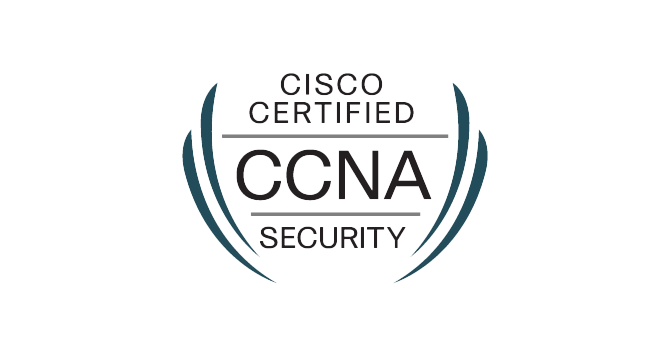.png)
Classroom
Small class room

Online
Virtual-Live/ Full Support

Exclusive
1-2-1/Tailored

CISCO CCNA Training
Course description
Cisco CCNA Training You'll learn about networking based on technology and cover networking concepts using a top-down, theoretical, and integrated approach. This will include network applications and the network protocols and services provided to those applications by the lower layers of the network. Helping you achieve CCNA (Cisco Certified Network Associate) 200-301 certification validates the competency as a computer network technician where one can learn network fundamentals, network access, IP connectivity, IP services, security fundamentals, automation, and programmability.
The CCNA Switching, Routing, and Wireless Essentials are suitable if you have advanced problem-solving and analytical skills. The curriculum is also a comprehensive and theoretical learning experience for analytical students and uses language that aligns well with engineering concepts.
Mindqube Limited has designed this course to prepare participants to be able to operate and work with different networking technologies. It is a prerequisite for many jobs and the certificate is recognized worldwide. Interactive activities are embedded in the curriculum, along with detailed, theoretical content. You can make use of our practical examples to develop your critical thinking and problem-solving skills through exploration and research.
- Network Fundamentels
- Network Access
- Ip Connectivity
- Ip Servies
- Security Fundamentak
- Automation and programmambilty
Network Fundamentals
- Ethernet Networks
- Collision and Broadcast Domain
- CSMA/CD
- Half– and Full–Duplex Ethernet
- Ethernet at the Data Link Layer, Physical Layer
- Straight–Through, Crossover and Rolled Cable
- Fibre Optic
- Data Encapsulation
- The Cisco Three–Layer Hierarchical Model
- The Core, Distribution and Access Layer
- Binary/Decimal/Hexadecimal Conversion
TCP/IP
- Introduction to TCP/IP
- TCP/IP and the DoD Model
- The Process/Application Layer Protocols
- The Host–to–Host or Transport Layer Protocols
- The Internet Layer Protocols
- IP Addressing
- IP Terminology
- The Hierarchical IP Addressing Scheme
- Private IP Addresses
- IPv4 Address Types
- Layer 2 Broadcasts and Layer 3 Broadcasts
- Unicast, Multicast Address
Subnetting
- Subnetting Basics, Create Subnets
- Subnet Masks
- Classless Inter–Domain Routing (CIDR)
- IP Subnet–Zero, Subnetting Class A, B, C Addresses
VLSMs, Summarization, and Troubleshooting TCP/IP
- Variable Length Subnet Masks (VLSMs)
- VLSM Design
- Implementing VLSM Networks
Port Fast and BPDU Guard
- Trunk ports, Add and remove VLANs on a trunk
- DTP, VTP (v1&v2), and 802.1Q, Native VLAN
- STP protocols
- STP mode (PVST+ and RPVST+), STP root bridge selection
- Cisco Discovery Protocol, LLDP
- Layer 2/Layer 3 EtherChannel
- Static, PAGP, LACP
Cisco Internetworking Operating System (IOS)
- The IOS User Interface
- Cisco IOS, Connecting to a Cisco IOS Device
- Bringing Up a Switch
- Command–Line Interface (CLI)
- Overview of Router Modes
- CLI Prompts
- Editing and Help Features
- Administrative Configurations
- Hostnames, Banners
- Setting Passwords, Encrypting Your Passwords
- Router and Switch Interfaces
- Bringing Up an Interface
- Viewing, Saving, and Erasing Configurations
- Deleting the Configuration and Reloading the Device
- Verifying Your Configuration
OSI and TCP/IP Models
- Application, Presentation, Session, Transport, Network, Data Link and Physical Layer
- TCP and UDP protocols
- CSMA/CD Operation, Encapsulation
- Infrastructure components, Firewalls, Access Points, Wireless Controllers
- Switching Services
- Three Switch Functions at Layer 2
- Port Security, Catalyst Switches
- Catalyst Switch Configuration
- Configuring Layer 2 Switches
- Configuring Port Security
- MAC learning and aging, Frame switching, Frame flooding
- MAC address table
LAN Switching Technologies
VLANs and Inter–VLAN Routing
- Introduction to VLAN
- Broadcast Control, Security
- Flexibility and Scalability
- Identifying VLANs, Frame Tagging
- VLAN Identification Methods
- Routing between VLANs
- Assigning Switch Ports to VLANs
- Trunk Ports, Inter–VLAN Routing
- Configuring Router on a Stick Routing
- Configuring IVR with a Layer 3 Switch
- Configure, verify, and troubleshoot Interswitch connectivity
- VLAN Trunking Protocol (VTP)
- VTP Pruning, Configuring VTP
- Troubleshooting VTP
- Spanning Tree Protocol (STP)
- Types of Spanning–tree Protocols
Routing Technologies
- IP Routing
- The IP Routing Process
- Testing IP Routing Understanding
- Configuring IP Routing
- Corp, SF and LA Configuration
- Static, Default and Dynamic Routing
- Routing Information Protocol (RIP)
- Configuring RIP Routing
- Creating Static Routes
- EIGRP
- OSPF
Layer 2 Switching
- Switching Services
- Three Switch Functions at Layer 2
- Port Security
- Configuring Layer 2 Switches
- Configuring Port Security
Security Fundamentals
- Define key security concepts threats, vulnerabilities, exploits, and mitigation
- Describe security program elements (user awareness, training, and physical access
- control
- Configure device access control using local passwords
- Describe security password policies elements, such as management, complexity, and
- password alternatives (multifactor authentication, certificates, and biometrics)
- Describe remote access and site-to-site VPNs
- Configure and verify access control lists
- Configure Layer 2 security features (DHCP snooping, dynamic ARP inspection, and port security)
- Differentiate authentication, authorization, and accounting concepts
- Describe wireless security protocols (WPA, WPA2, and WPA3)
- Configure WLAN using WPA2 PSK using the GUI
- Automation and Programmability
- Explain how automation impacts network management
- Compare traditional networks with controller-based networking
- Describe controller-based and software defined architectures
- Compare traditional campus device management with Cisco DNA Center enabled device
- Management
- Describe characteristics of REST-based APIs (CRUD, HTTP verbs, and data encoding)
Suitability - Who should attend?
This course is suitable for all levels.

Career Prospectt
Senior Network Engineer
Network Engineer
Network Support Analyst
2nd Line Network Engineer
Cisco Network Engineer
Level 2 Network Service Engineer
Network & Security Engineerr
Our Training Benefits Include:
Benefit from our value-added features:
Schedule
| Start Date | End Date | Timing | Days | Duration | Mode | ||
|---|---|---|---|---|---|---|---|
| 06/03/2023 | 06/05/2023 | 10:00 – 18:00 | Monday Only | 1 Day | Classroom Based | RESERVE NOW | BOOK NOW |
| 12/06/2023 | 12/08/2023 | 10:00 – 18:00 | Monday Only | 1 Day | Classroom Based | RESERVE NOW | BOOK NOW |
| 14/08/2023 | 14/10/2023 | 10:00 – 18:00 | Monday Only | 1 Day | Classroom Based | RESERVE NOW | BOOK NOW |
| 20/11/2023 | 20/12/2023 | 10:00 – 18:00 | Monday Only | 1 Day | Classroom Based | RESERVE NOW | BOOK NOW |
Schedule
Start Date :
06/03/2023
End Date :
06/05/2023
Timing :
10:00 – 18:00
Days :
Monday Only
Duration :
1 Day
Mode :
Classroom Based
Start Date :
12/06/2023
End Date :
12/08/2023
Timing :
10:00 – 18:00
Days :
Monday Only
Duration :
1 Day
Mode :
Classroom Based
Course Content
This course covers the following topics:
HARDWARE
Identifying, using, and connecting hardware components and devices, including the broad knowledge about different devices that is now necessary to support the remote workforce
OPERATING SYSTEMS
Install and support Windows OS including command line & client support. System configuration imaging and troubleshooting for Mac OS, Chrome OS, Android and Linux OS.
SOFTWARE TROUBLESHOOTING
Troubleshoot PC and mobile device issues including common OS, malware and security issues.
NETWORKING
Explain types of networks and connections including TCP/IP, WIFI and SOHO
TROUBLESHOOTING
Troubleshoot real-world device and network issues quickly and efficiently
SECURITY
Identify and protect against security vulnerabilities for devices and their network connections
MOBILE DEVICES
Install & configure laptops and other mobile devices and support applications to ensure connectivity for end- users
VIRTUALIZATION & CLOUD COMPUTING
Compare & contrast cloud computing concepts & set up client-side virtualization
OPERATIONAL PROCEDURES
Follow best practices for safety, environmental impacts, and communication and professionalism
Enquire Now

Do You Have Questions ?
We'll help you to grow your career and growth..png)







.png)

